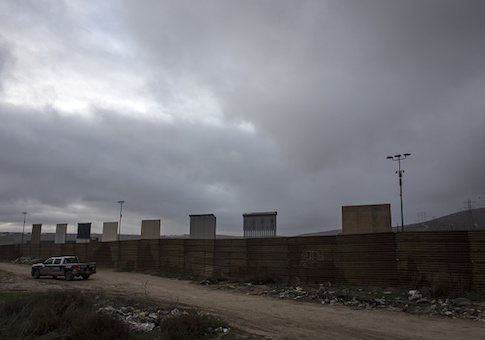U.S. District Judge Gonzalo Curiel, who President Trump previously said would hold a bias against him because of his Mexican heritage, has cleared a legal hurdle for Trump's long-promised border wall.
Curiel ruled on Tuesday that the Trump administration has the power to waive numerous environmental laws and other regulations to begin construction on the long-promised border wall.
Several environmental groups had challenged the constitutional and legal authority of the Department of Homeland Security to bypass required environmental impact analyses of building the border wall, as well as public input that is usually required when the federal government plans major construction projects.
Justice Department spokesman Devin O'Malley applauded the ruling.
"Border security is paramount to stemming the flow of illegal immigration that contributes to rising violent crime and to the drug crisis and undermines national security," he said. "Congress gave authority to the Department of Homeland Security to construct a border wall without delay to prevent illegal entry into the United States, and we are pleased DHS can continue this important work vital to our nation's interest."
The construction of the border wall still faces a major funding obstacle, with Congress failing to provide the money needed to move beyond the prototype phase of the project.
Curiel drew Trump's fire during the campaign while he presided over a lawsuit against Trump University. Trump set off a firestorm of criticism when he challenged Curiel's impartiality, arguing in June 2016 that Curiel, who was born in Indiana, could not rule fairly in the case because of his Mexican heritage and his likely disagreement with Trump's immigration policies.
Curiel ultimately approved a $25 million settlement for thousands of Trump University students, allowing them to get most of their money back.
Curiel made a point in his order to note that the court "cannot and does not consider whether underlying decisions to construct the border barriers are politically wise or prudent."
The ruling referred to a 1996 immigration reform law the Congress passed and a 2005 amendment to it that gives the Homeland Security secretary the power to waive federal, state, and local laws, to expedite construction of fencing along the border in San Diego.
The waiver authority was later interpreted to apply to border-wall construction under the 2006 Secure Fence Act, which requires DHS to build 700 miles of border barriers.
A spokesman for the Center for Biological Diversity, one of the environmental groups who brought the lawsuit, said it plans to appeal the ruling.
"We intend to appeal this disappointing ruling, which would allow Trump to shrug off crucial environmental laws that protect people and wildlife," said Brian Segee, a senior attorney at the center. "The Trump administration has completely overreached its authority in its rush to build this destructive, senseless wall."
The group said the border wall construction plans could destroy vital wetlands, streams and other habitat critical for numerous endangered species, including the Quino Checkerspot butterfly and the coastal California gnatcatcher bird.
The U.S. government has used the waiver authority to build fences and other barriers along the border dating back to the George W. Bush administration. The authority has faced many challenges but courts have always upheld it.
Trump in mid-March plans to visit San Diego and inspect the border wall prototypes built on the Otay Mesa border area.
